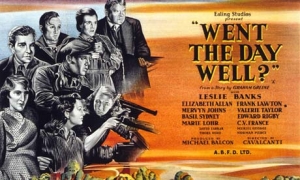
WENT THE DAY WELL
UK, 1942, 88 minutes, Black and white.
Leslie Banks, Valerie Taylor, Basil Sydney, Mervyn Johns, Edward Rigby, Marie Lohr, David Farrar, Thora Hird.
Directed by Cavalcanti.
Went the Day Well was made in 1942, a home front film for morale-boosting at the height of World War II. It begins, optimistically, with the end of the war and the defeat of Hitler. It offers the fantasy - chilling for the audience at the time - of a quiet invasion of an English village by German soldiers disguised as British soldiers. When they are discovered, they turn nasty and are brutal towards the villagers. They are there to plan and contribute to a Nazi invasion of England. When the British fight back, there is a fierce energy, a relish of destroying the Germans which looks a bit bloodthirsty as well as patriotic these days. The battle sequences at the end are the least convincing, especially by contemporary standards of war films and battle sequences. However, it is still an impressive morale-boosting war film and interesting for the imaginative look of an infiltration of the village.
The film was based on a short story by Graham Greene, The Lieutenant Died Last Night. The film has a strong cast of British character actors led by Leslie Banks, surprisingly cast as the suave villager who, in fact, is a Nazi spy. Basil Sydney and David Farrar lead the Germans. Amongst the locals are the verger of the church, Mervyn Johns who narrates the film, Marie Lohr as a strong-minded resident of the manor, Thora Hird in an early role in a career which was to last another sixty years. Cavalcanti made a number of films in Britain, the most notable of which were Dead of Night, with Michael Redgrave and Mervyn Johns, and a version of Nicholas Nickleby.
1. The impact of the film in its time? Imagining an infiltration by the Nazis? How the British would respond with courage? The date of the film, released in 1942 with another three years of the war to go? The effect now and audience knowledge of what happened?
2. The black and white photography, the realism, the village, the countryside? The use of the West Gloucestershire troops? The rousing musical score by William Walton?
3. The title and the poem at the beginning of the film? The irony and the victory for the British?
4. The time of the invasion, the detail of the particular times of the day and the weekend? A sense of urgency?
5. The narration by Charlie, the morale-boosting at the beginning of the film, the flashbacks to the battle, his comments at the end and the encouragement for British viewers at the time?
6. Life in the village, the church, church services, the sailor's wedding? The phone exchange? The inn? The postman, the policeman, the poacher? The children? The manor, Mrs Fraser, Nora? The range of ordinary people?
7. The credibility of the German infiltration, the commander, his officers? The village believing the soldiers? Finding billets for them, putting them in the church, the commander living at the vicarage? The manor house? The friendliness of the people? The response of the Germans, generally keeping to a very British tone? The mistake with the keeping score at cards with continental numbers? Mrs Collins and the telegram and her showing it to Nora? George finding the chocolate with the German title?
8. Oliver as the leader of the village, his arm injury, people's dependence on him, suave, commonsense? Nora and her attraction? Her going to him with the difficulty, his explaining it as a test? Audience shock at his being a German, his collaboration with the commander, going up to the hill, preparing the strategies? Going with the villagers into the church? Stopping the phone links? His callousness, the murder of the policeman during the escape? His being free, Nora and Mrs Fraser overhearing him? His plausible explanations? Contact with the commander through phone? Nora shooting him?
9. The reaction of the people, the wedding, the vicar ringing the bell as a signal, his being shot? The rounding up of everyone? Everything seeming to be normal - the young boy and his deliveries, the postman, the cousin coming to visit? Their being allowed in and to leave? The attempts of the people to get messages out - on the eggs, on the card score but it blowing out of the window, the phone exchange girls being catty towards Mrs Collins and not answering and causing her death?
10. The attempts to get help: George and his leaving during the night, with the poacher, persuading him that it was true, his being shot, getting to the village, giving the information? The sailor and the others getting rid of the sentries in the church, attacking them? Getting out and being able to phone? Mrs Collins and her killing the German, her being killed? The impact on the village people?
11. Mrs Fraser, the children, with Nora, the hand grenade and her taking it out of the room and dying to save the children? Nora and her disillusionment with Oliver and shooting him? Her grief for her father?
12. The officer commanding, his callous German attitudes after the smooth English tone? His strategies? His officer, the drinking, the threat to the hostages?
13. The attack, the death of the Home Guard? The people from Upton and the Home Guard attacking, defeating the Germans?
14. A glimpse of a period of threat to England, the patriotic response and self-confidence? And the ultimate winning of the war?